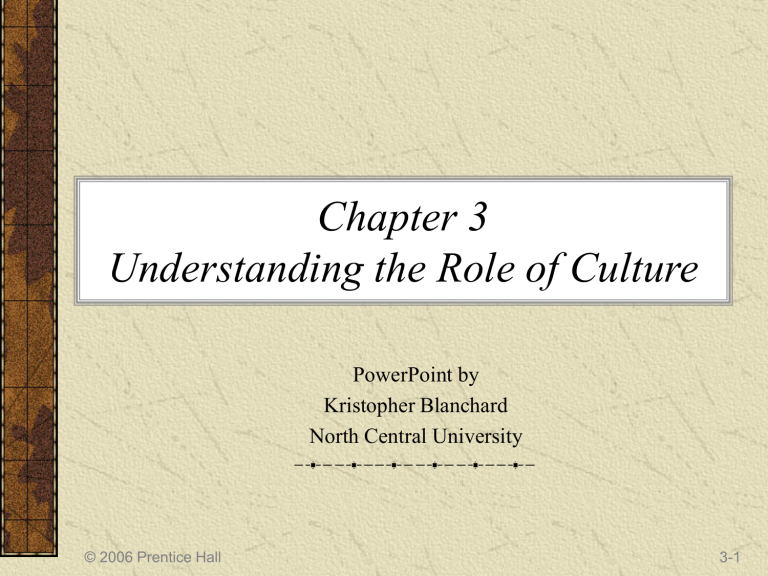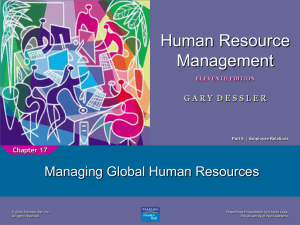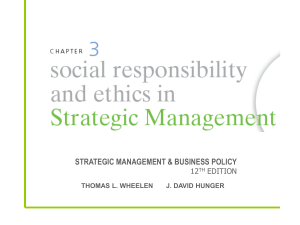ch3 (2)
advertisement

Chapter 3 Understanding the Role of Culture PowerPoint by Kristopher Blanchard North Central University © 2006 Prentice Hall 3-1 Overview Culture and its effects on organizations Cultural variables Cultural value dimensions The Internet and culture Developing cultural profiles Culture and management styles around the world © 2006 Prentice Hall 3-2 Key Terms Culture Savvy Cultural Sensitivity or Cultural Empathy Culture of a society Self reference criterion Parochialism Ethnocentrism © 2006 Prentice Hall 3-3 Culture and Its Effects on Organizations © 2006 Prentice Hall 3-4 Culture and Its Effects on Organizations Once upon a time there was a great flood, and involved in this flood were two creatures, a monkey and a fish. The monkey, being agile and experienced, was lucky enough to scramble up a tree and escape the raging waters. As he looked down from his safe perch, he saw the poor fish struggling against the swift current. With the best of intentions, he reached down and lifted the fish from the water. The result was inevitable. © 2006 Prentice Hall 3-5 Cultural Variables Never assume that a manager can transplant American, or Japanese, or any other country’s styles, practices, expectations, and processes Managers need to develop a cultural profile that identifies the specific differences found in each country © 2006 Prentice Hall 3-6 Subcultures Residents of the country only conform to the national character to a certain degree Could be from ethnic, geographic, or other variables Good managers treat people as individuals and they avoid any form of stereotyping © 2006 Prentice Hall 3-7 Influences on National Culture Kinship – guides family relationships Education – formal or informal education of workers affects workplace expectations Economy – means of production and distribution in a society influences all aspects of the resource allocation Politics – system of government imposes varying constraints on an organization © 2006 Prentice Hall 3-8 Influences on National Culture Religion – spiritual beliefs of a society are so powerful that they overpower all other cultural aspects Associations – the formal and informal groups that make up a society Health – system of health care affects employee productivity Recreation – the use, attitude, and choice of how to use leisure time © 2006 Prentice Hall 3-9 Cultural Value Dimensions Values are a society’s ideas about what is good or bad, right or wrong © 2006 Prentice Hall 3-10 Project GLOBE Cultural Dimensions Assertiveness: tough, confrontational, and competitive vs. modest and tender Future orientation: planning and investing vs. short term or instant gratification Performance Orientation: performance improvement and excellence, initiative and a sense of urgency vs. tradition, loyalty, family, and an association of competition with defeat Humane Orientation: fairness, generosity, caring and kindness vs. power and self-enhancement © 2006 Prentice Hall 3-11 Cultural Clusters Ten cultural clusters MNCs may find it less risky and more profitable to expand into more similar cultures rather than those which are drastically different. © 2006 Prentice Hall 3-12 Hofstede’s Value Dimensions Power Distance – How much people accept equality in power; high power distance reflects an acceptance of power inequality among institutions, organizations, and individuals. Low power distance means people expect equality in power Uncertainty Avoidance – The degree to which members of a society feel uncomfortable with uncertainty and ambiguity and thus support beliefs and behaviors that promise certainty and conformity Individualism – A value for a loosely knit social framework in which individuals are expected to take care of themselves Collectivism – A preference for a tightly knit social framework in which people look out for one another and organizations protect their members’ interests Masculinity – A preference for achievement, heroism, assertiveness, work centrality, and material success Femininity – A preference for relationships, cooperation, group decision making, and quality of life Rank Orderings of 10 Countries Along Four Dimensions of National Value Systems (adapted) Country Australia Costa Rica France India Japan Mexico Sweden Thailand United States © 2006 Prentice Hall Power Uncertainty Individualism Masculinity 7 8 3 2 5 1 10 4 6 7 2 (tie) 2 (tie) 9 1 4 10 6 8 2 10 4 6 7 8 3 9 1 5 9 7 6 1 2 10 8 4 3-15 Critical Operational Value Differences Time Change Material factors Individualism © 2006 Prentice Hall 3-16 The Internet and Culture Norms of information privacy differ among nations and have their roots in culture and history, e.g. Europeans attitudes toward privacy are much stricter than in the US> © 2006 Prentice Hall 3-17 Developing Cultural Profiles Composite pictures of working environments, people’s attitudes, and norms of behavior developed from research, personal observations, and discussions with people. Used to anticipate differences in things like motivation, communication, ethics, loyalty, and individual and group productivity © 2006 Prentice Hall 3-18 Comparative management in Focus See examples in text © 2006 Prentice Hall 3-19 Culture and Management Styles See examples in text of Saudi Arabia and China. © 2006 Prentice Hall 3-20 Looking Ahead Chapter 4 - Communicating Across Cultures – The Communication Process – The Culture – Communication Link – Information Technology © 2006 Prentice Hall 3-21 Culture Savvy A working knowledge of the cultural variables affecting management decisions Return © 2006 Prentice Hall 3-22 Cultural Sensitivity or Cultural Empathy An awareness and an honest caring about another individual’s culture. Return © 2006 Prentice Hall 3-23 Culture of a society Comprises the shared values, understandings, assumptions, and goals that are learned from earlier generations, imposed by present members of a society, and passed on to succeeding generations. Return © 2006 Prentice Hall 3-24 Self reference criterion The unconscious reference point of one’s own cultural values Return © 2006 Prentice Hall 3-25 Parochialism Occurs when a Frenchman, for example, expects those from or in another country to automatically fall into patterns of behavior common in France. Return © 2006 Prentice Hall 3-26 Ethnocentrism Describes the attitude of those who operate from the assumption that their ways of doing things are best – no matter where or under what conditions they are applied Return © 2006 Prentice Hall 3-27




